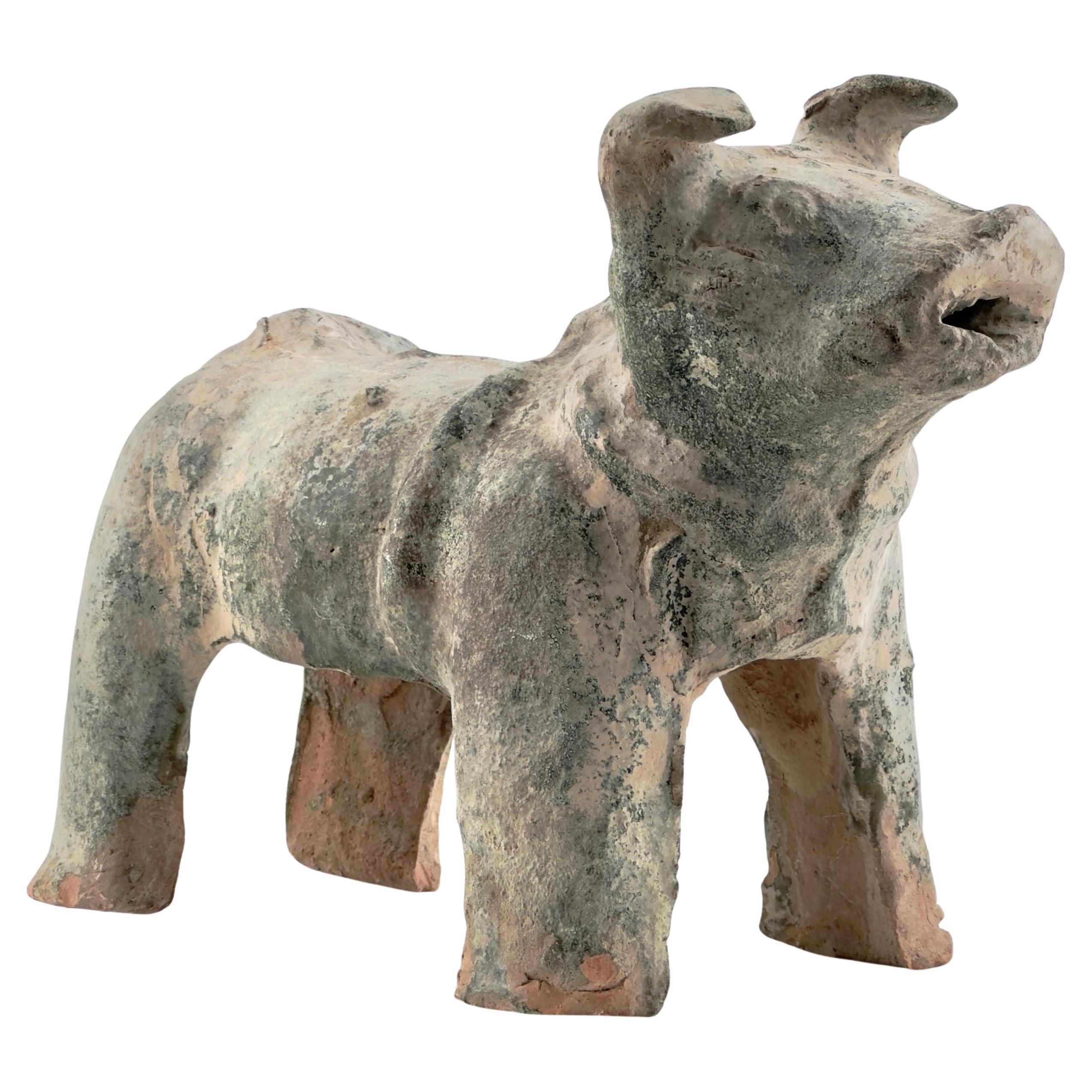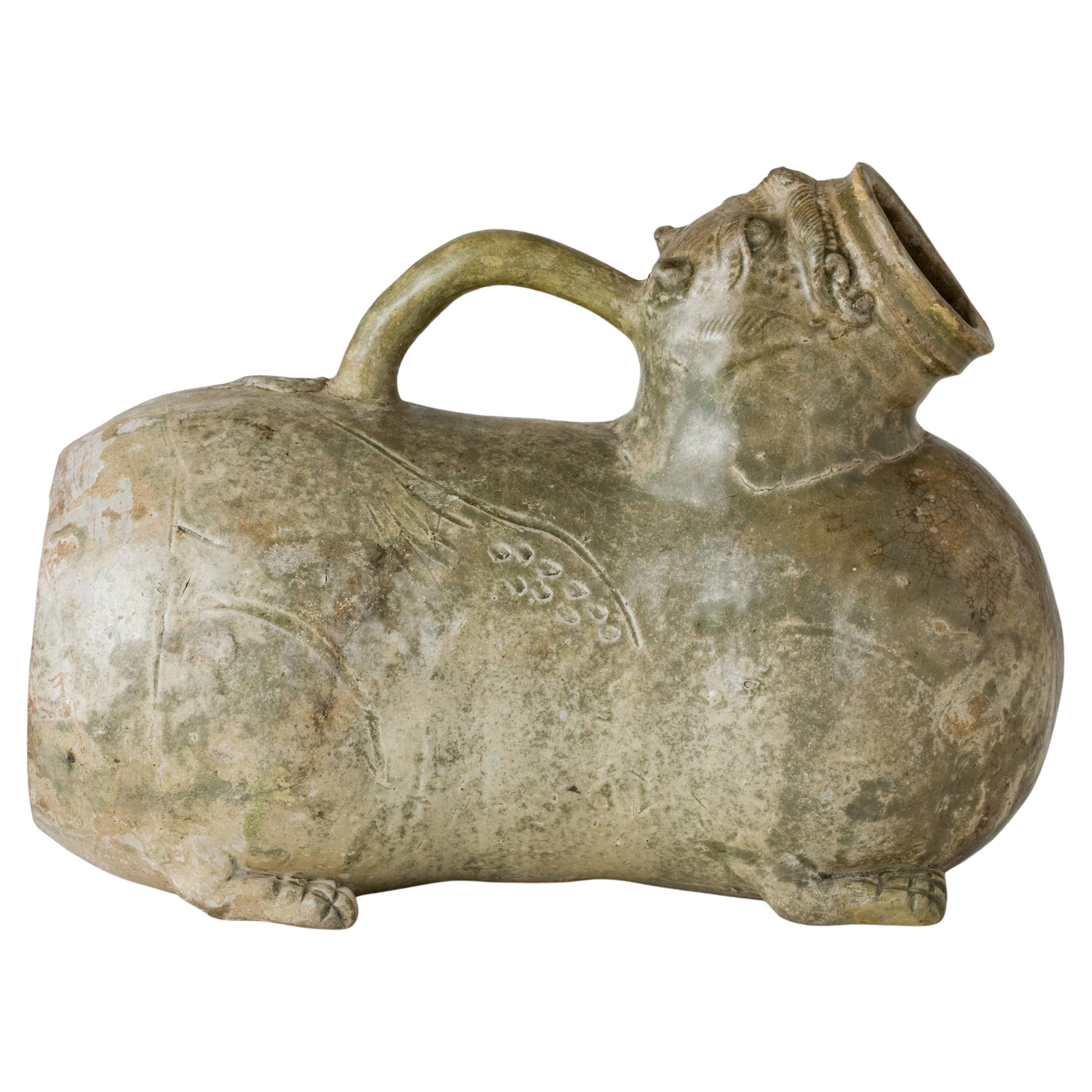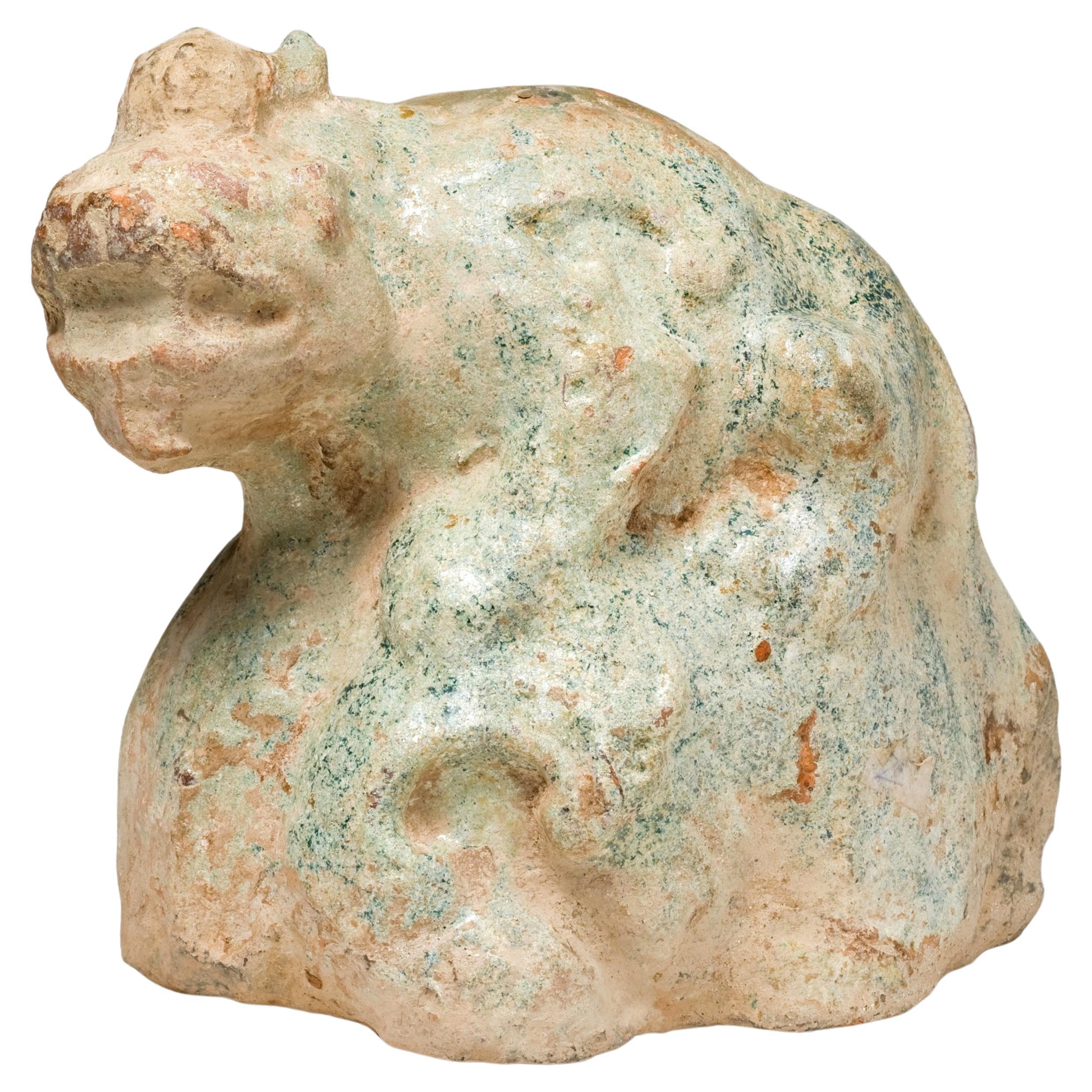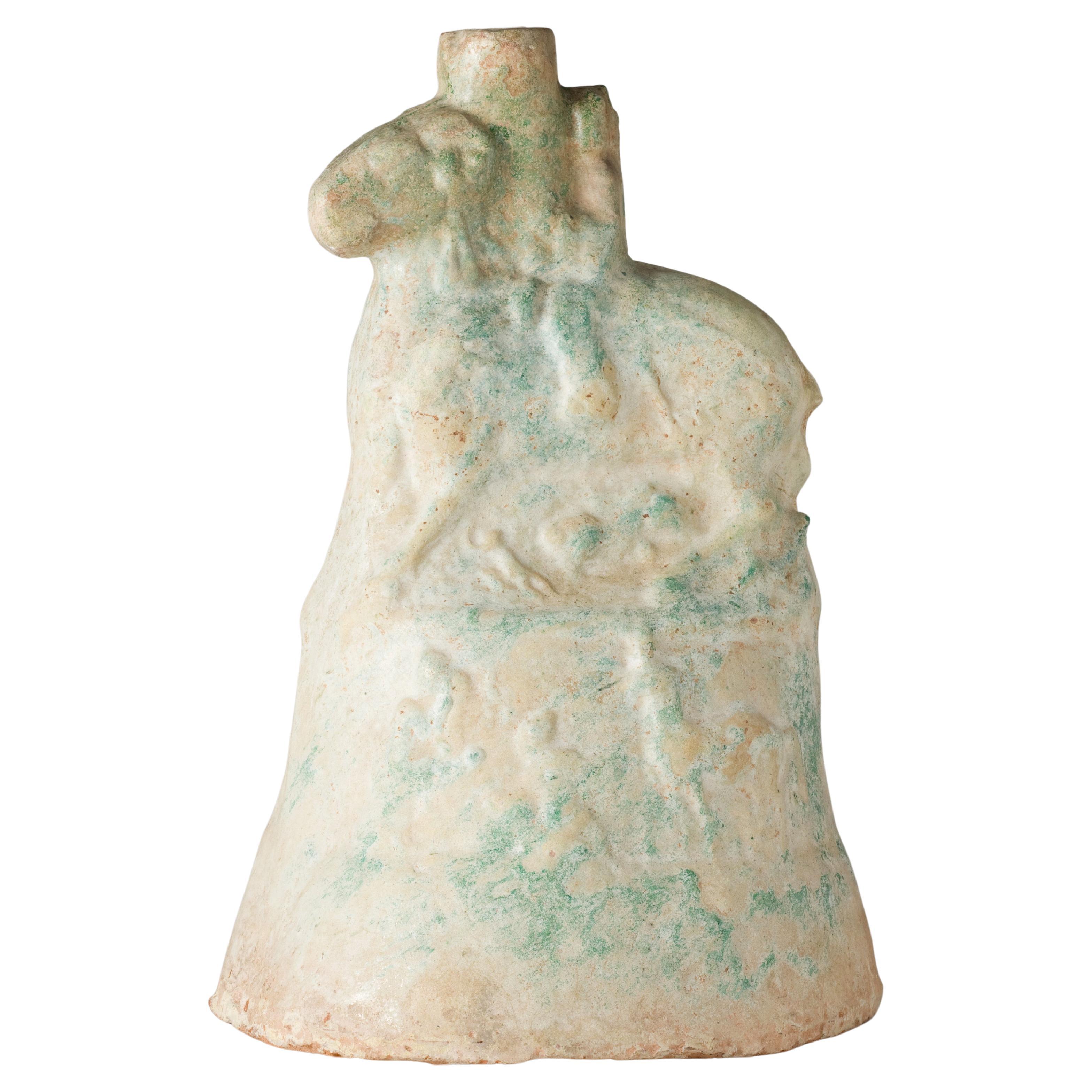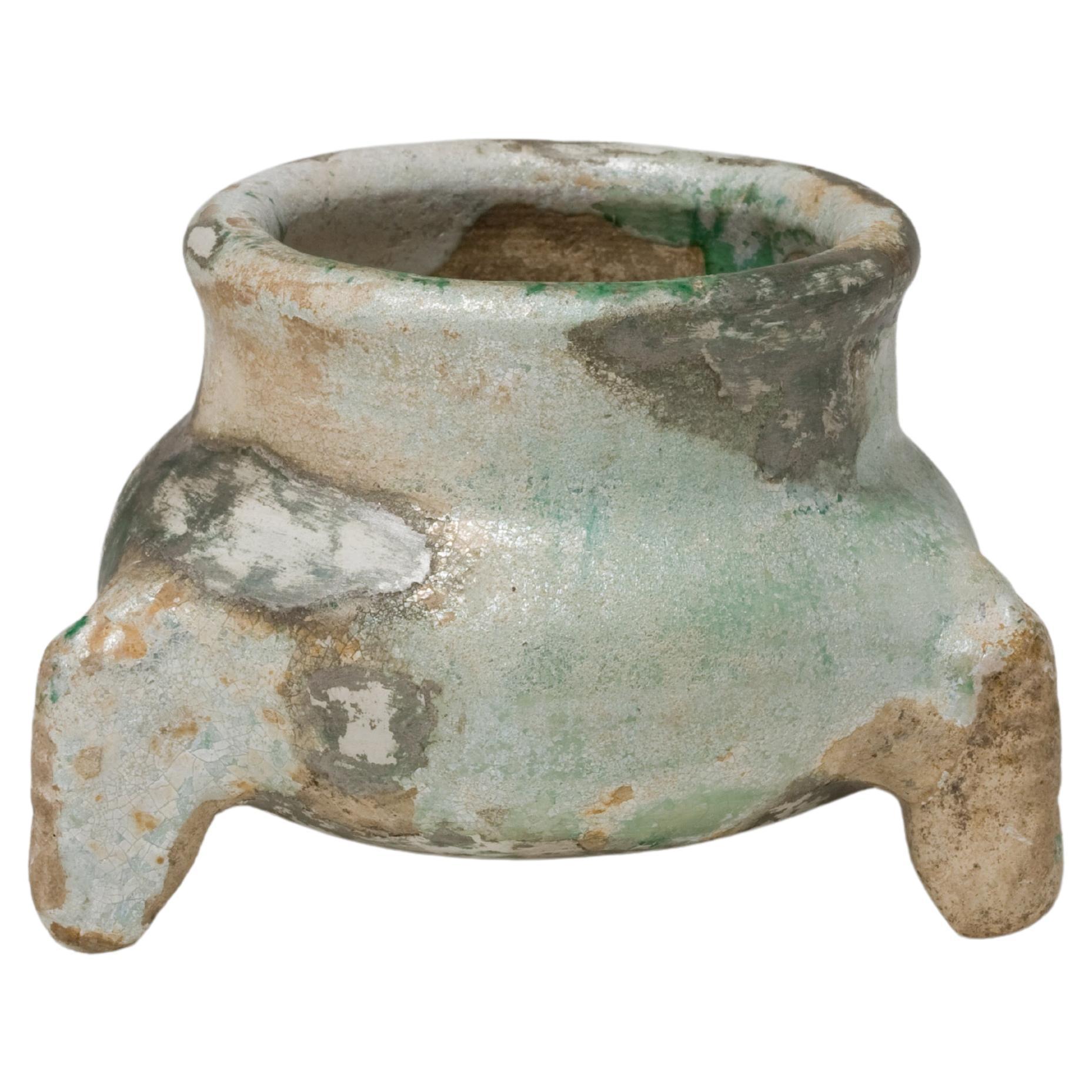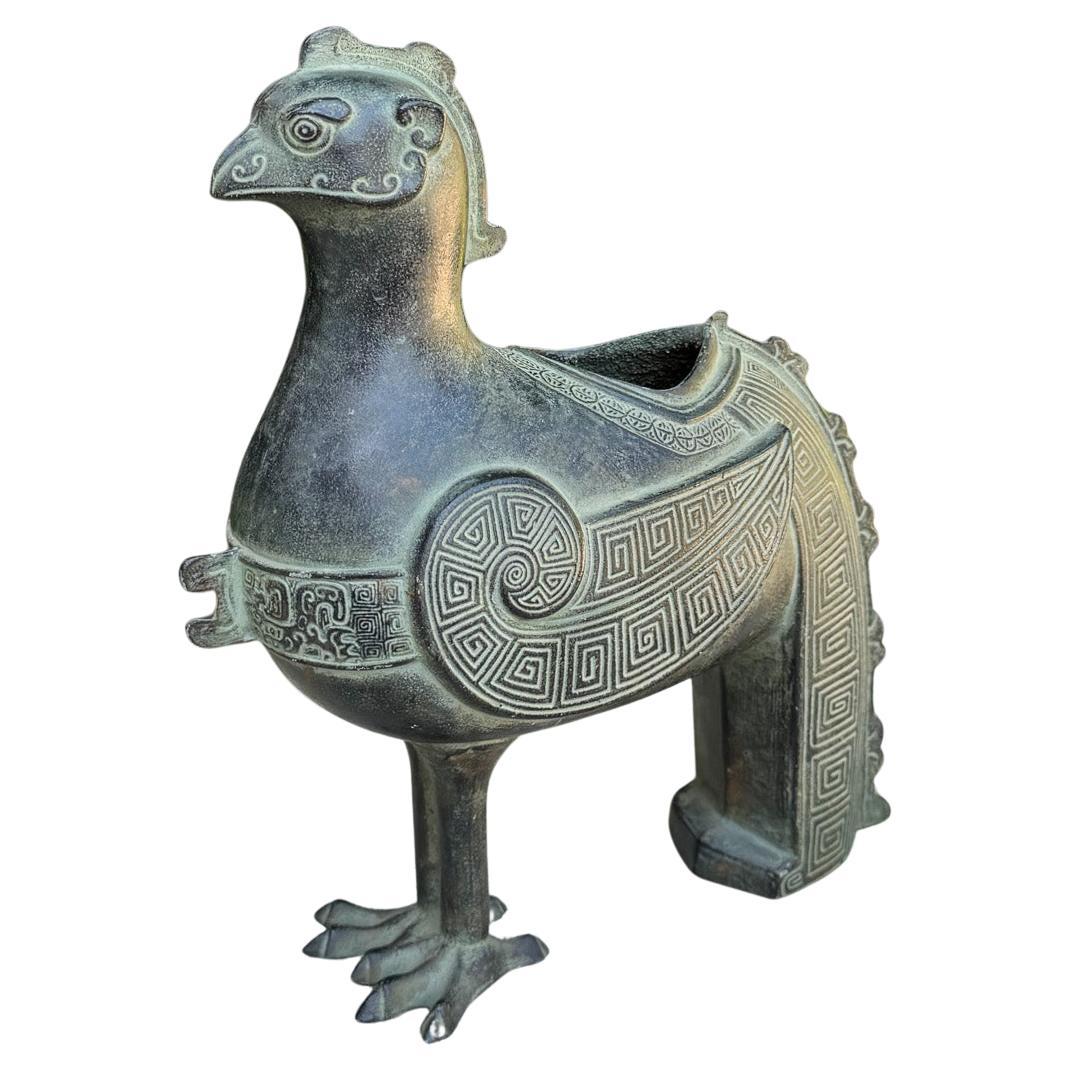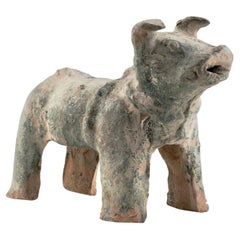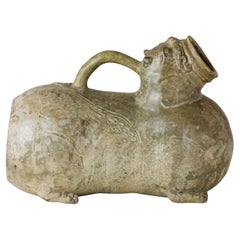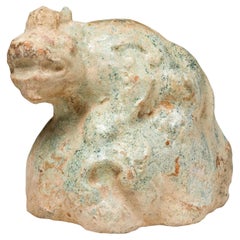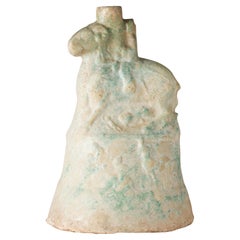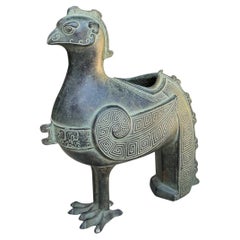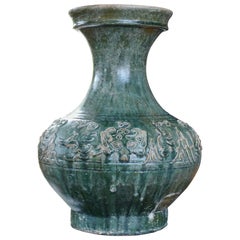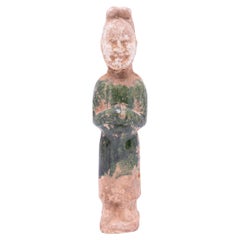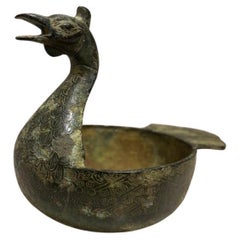Items Similar to Green Glazed Pottery Figure of Rooster, Han dynasty (206 BC-220 AD)
Want more images or videos?
Request additional images or videos from the seller
1 of 16
Green Glazed Pottery Figure of Rooster, Han dynasty (206 BC-220 AD)
$2,092.50
$2,79025% Off
£1,607.59
£2,143.4525% Off
€1,847.10
€2,462.8025% Off
CA$2,943.36
CA$3,924.4825% Off
A$3,306.73
A$4,408.9825% Off
CHF 1,727.77
CHF 2,303.7025% Off
MX$40,360.23
MX$53,813.6425% Off
NOK 21,937.68
NOK 29,250.2325% Off
SEK 20,649.70
SEK 27,532.9325% Off
DKK 13,783.77
DKK 18,378.3625% Off
About the Item
The head is rounded, with minimal detailing of the beak, eyes, and comb. The neck is thick and solid, seamlessly transitioning into the body, which appears sturdy and compact, giving the figure a sense of stability.
The most prominent feature of the sculpture is the tail, which is slightly exaggerated in size. The tail arches upward in a broad curve, likely intended to balance the weight of the sculpture on both sides. This exaggerated form contributes to the visual stability of the piece and enhances the overall harmony of its design.
The surface of the sculpture shows signs of natural aging, with traces of green glaze that have oxidized over time, as a result of being buried for an extended period. This greenish patina adds a historical dimension to the piece, showcasing how the glaze has transformed naturally.
Period : Han Dynasty (206 BC - 220 AD)
Type : Animal statue
Medium : Green glazed pottery
Dimension : 14cm(Height) x 17cm(Diameter)
Provenance : The piece was acquired in Hong Kong in late 1990s.
Condition : Good (Minor repair on the left hind leg's thigh)
Reference :
1) Sotheby's Hongkong 30 November 2017 - Chinese Art Including Selected Works Of Art From The T.Y. Chao Family Collection - Lot 302
(Price realised : 81,250 HKD / Type : related)
2) Asian Art Museum Sanfrancisco - Object number 2017.47 - Model of a rooster
(Type : Closely related)
3) Montreal Museum of Fine Arts - Gift of the Guérin-van Oenen family, inv. 2018.289 - Funerary Statuette : Rooster
(Type : Closely related)
* Han Dynasty Pottery
Han Dynasty pottery, originating from one of China's most significant historical periods (202 BCE – 220 CE), is renowned for its technological and artistic achievements in ceramic production. These artifacts typically feature a distinctive green glaze, although other colors were also used. The pottery often includes intricate decorative motifs, such as animals, mythological figures, and geometric patterns.
The craftsmanship during the Han Dynasty was advanced, with pottery techniques that were innovative for the time. These pieces were not only utilitarian but also held ceremonial and symbolic significance. The shapes and designs of Han Dynasty pottery vary, including items like urns, vases, and figures, reflecting both the daily life and the spiritual beliefs of the period
About the Seller
4.8
Gold Seller
Premium sellers maintaining a 4.3+ rating and 24-hour response times
Established in 1999
1stDibs seller since 2023
38 sales on 1stDibs
Typical response time: <1 hour
- ShippingRetrieving quote...Shipping from: seoul, Korea South
- Return Policy
Authenticity Guarantee
In the unlikely event there’s an issue with an item’s authenticity, contact us within 1 year for a full refund. DetailsMoney-Back Guarantee
If your item is not as described, is damaged in transit, or does not arrive, contact us within 7 days for a full refund. Details24-Hour Cancellation
You have a 24-hour grace period in which to reconsider your purchase, with no questions asked.Vetted Professional Sellers
Our world-class sellers must adhere to strict standards for service and quality, maintaining the integrity of our listings.Price-Match Guarantee
If you find that a seller listed the same item for a lower price elsewhere, we’ll match it.Trusted Global Delivery
Our best-in-class carrier network provides specialized shipping options worldwide, including custom delivery.More From This Seller
View AllGreen Glazed Red Pottery Figure of Dog, Han dynasty (206 BC-220 AD)
Located in seoul, KR
The dog faces forward, with clearly defined eyes that stand out. Its ears are slightly curled, giving the impression of a relaxed, natural stance. The collar around its neck, connect...
Category
Antique 15th Century and Earlier Hong Kong Han Antiquities
Materials
Pottery
$2,242 Sale Price
25% Off
A Rare Yue Celadon-Glazed Figural Vessel, Western Jin dynasty (265-420)
Located in seoul, KR
This vessel is well-modeled as a recumbent winged lion with detailed decorative elements. It features a grimacing face with large protruberant eyes under heavy brows and a gaping mouth, which forms a large aperture. The piece has a tail that arches to form a loop handle, and the wings are incised on the sides. The whole piece is finished with a thin olive-green glaze.
This kind of figural vessel dates back to at least the Western Han dynasty, with the design fully developed in the Yue kilns of Zhejiang province during the 3rd and 4th centuries. Such zoomorphic forms became popular among the literati and were transformed into various functional objects like wine ewers and water pots.
There is a pair, and you can check it in the uploaded list. If you would like to purchase two in pairs, please leave a message.
Period : Western Jin Dynasty (266 - 316 AD)
Type : Figural vessel
Medium : Yue celadon(Stoneware)
Provenance : The piece was acquired in Hong Kong in late 1990s.
Reference :
1) Sotheby's New York 17 March 2015 - Chinese Art Through The Eye Of Sakamoto Gorō – Ceramics Lot 33
(Price Range : 15,000 USD-20,000 USD / Type : Highly related)
2) Sotheby's London 17 May 2023 - A Journey Through China's History. The Dr Wou Kiuan Collection Online. Part I - Lot 30
(Price realised : 13,970 GBP / Type : Closely related)
3) Ethnological Museum, Berlin, Germany - Pouring vessel in animal shape, China, Yue kilns, Zhejiang province, late Western or early Eastern Jin dynasty, 4th century
4) Sotheby's London 16 May 2018 - Important Chinese Art Lot 68
(Price realised : 50,000 GBP / Type : Closely related)
5) The MET - Accession Number: 1985.207 - Vessel in the Shape of a Tiger (Huzi)
(Type : Closely related)
* Yue Celadon
Yue celadon, also known as Yue ware, is a type of Chinese pottery with a celadon glaze, originating from the eastern Han dynasty in the Zhejiang province. The name 'Yue' comes from the Yue kilns which were among the earliest to develop the celadon technique. Yue ware is known for its jade-like glaze, which can range in color from bluish-green to olive green.
Yue celadon was highly regarded during its time and was the first Chinese ware...
Category
Antique 15th Century and Earlier Hong Kong Chinese Export Antiquities
Materials
Celadon
$9,950 Sale Price
50% Off
Green-glazed model of a Haitai, Han dynasty
Located in seoul, KR
This Han Dynasty green-glazed Haitai sculpture, though worn over time, retains its dynamic form.
Period : Han Dynasty (206 BC - 220 AD)
Medium : Earthenware with Green glaze
Provena...
Category
Antique 15th Century and Earlier Hong Kong Han Antiquities
Materials
Pottery
$2,250 Sale Price
25% Off
Green-Glazed Pottery ‘Money Tree’ Base, Han Dynasty
Located in seoul, KR
This piece, directly referred to as a Money Tree, is a captivating work that embodies wishes for material prosperity. It takes center stage in the Asian collections of institutions s...
Category
Antique 15th Century and Earlier Hong Kong Han Antiquities
Materials
Earthenware, Pottery
$19,500 Sale Price
35% Off
Green-Glazed Tripod Vessel, Han Dynasty
Located in seoul, KR
Han Dynasty green-glazed tripods are comparatively rare, especially ones that have retained their structural integrity and glaze over millennia. Pieces in good condition are scarce b...
Category
Antique 15th Century and Earlier Hong Kong Han Antiquities
Materials
Earthenware
$1,235 Sale Price
35% Off
Green-glazed pottery 'figural' lamp, Han Dynasty
Located in seoul, KR
The lamp shaped as a kneeling female figure wearing long robes, her face with a large nose, deep-set eyes and pronounced cheeks, holding an infant in her lap, her cylindrical and elo...
Category
Antique 15th Century and Earlier Hong Kong Han Antiquities
Materials
Earthenware
You May Also Like
A Chinese Bird Shaped Figural Censor / Vessel, 20th Century
By William Billy Haines
Located in San Juan Capistrano, CA
A Chinese Bird Shaped Figural Censor / Vessel, 20th Century.
Category
20th Century Chinese Chinoiserie Vases
Materials
Metal
Large Han Dynasty Hu Green Glazed Mythical Beasts Vessel
Located in Dallas, TX
A large and decorative Chinese green-glazed pottery hu vase.
Han dynasty (206 BC - 220 AD).
The compressed globular body encircled by eight mystical beasts of monkeys, Rabbits, de...
Category
Antique 15th Century and Earlier Chinese Han Vases
Materials
Pottery
Green Glazed Chinese Mingqi Spirit Scholar
Located in Chicago, IL
Molded of earthenware, this petite sculpture is a type of centuries-old burial figurine known as míngqì. Such model figures were placed in tombs of individuals with high status to ensure a safe journey to the afterlife. Meant to depict the pleasures of daily life, common burial figures...
Category
Antique 15th Century and Earlier Chinese Chinese Export Antiquities
Materials
Ceramic
Chinese Archaistic Duck Form Dish With Incised Decoration Verdigis Patina
Located in Stamford, CT
Chinese archaistic bronze dish in the form of a duck with beautifully etched stylized neck and tail feathers, geometric and spiral designs on the sides. Wonderful variegated verdigri...
Category
Early 20th Century Chinese Archaistic Animal Sculptures
Materials
Bronze
Large Antique Chinese Export Turquoise Glazed Rooster
Located in Atlanta, GA
This Large Antique Chinese Export Turquoise Glazed Rooster is a fine example of traditional Chinese ceramic artistry, likely from the Qing Dynasty period or early 20th century. The f...
Category
Mid-20th Century Chinese Chinese Export Ceramics
Materials
Porcelain
$716 Sale Price
20% Off
Antique Chinese Carved Jade Figure of a Phoenix, "Freedom, Eternal Life"
Located in New Orleans, LA
Antique Chinese late 19th century carved jade figure of a phoenix, "Freedom, Eternal Life."
Category
Antique Late 19th Century Chinese Animal Sculptures
Materials
Jade
More Ways To Browse
Chinese Green Glazed Pottery
Chinese Glazed Figure
Chinese Pottery Figure
Rooster Vase
Pottery Bc
Chinese Rooster
Pottery Eyes
Chinese Green Glazed Animal
Ceramic Animals Life Size
Chinese 3 Piece Vases
Asian Green Statues
Han Dynasty Vase
Pottery Rooster
Han Dynasty Figure
Chinese Ceramic Statues
Chinese Pottery Statue
Han Dynasty Statue
Chinese Comb
